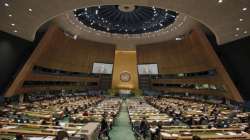Peacekeeping operations should not be substitute for addressing root causes of conflict: India
India, one of the largest troop contributing countries to UN peacekeeping operations, also reiterated the impact of caveats on performance.

UN peacekeeping operations serve primarily as a tool to support a viable political process and should not be used as a substitute for addressing the root causes of the conflict, India has said.
Speaking at a thematic debate on peacekeeping operations in the Special Political and Decolonization (Fourth) Committee of the General Assembly, First Secretary in the Permanent Mission of India to the UN Sandeep Kumar Bayyapu said increasingly, the focus of peacekeeping is on a 'robust' approach and technological aspects.
It often appears to lose focus on the ultimate goal of seeking a political solution to the conflict, he said.
"We need to keep in mind the lessons that we have learnt over last half century of peacekeeping activities in order to face the challenges of 21st Century," he said on Tuesday.
"Peacekeeping serves primarily as a tool to support a viable political process. The peacekeeping operations should not be used as a substitute for addressing the root causes of conflict," Bayyapu said Tuesday.
India, one of the largest troop contributing countries to UN peacekeeping operations, also reiterated the impact of caveats on performance.
"The insistence by some on caveats in deployment is unfair and places peacekeepers at different levels. Caveats, whether declared or undeclared, are against the basic principle of equality," Bayyapu said.
He said that caveats also have a direct impact on the fulfilment of missions’ mandate as they limit the Force Commander’s ability to employ forces in an optimal manner.
"We need to do away with all caveats as it is not possible to fairly assess the performance of peacekeepers operating at different levels," he said.
Stressing that incidents of sexual exploitation and abuse not only scar the victims but also impact the UN’s credibility, Bayyapu said India is a strong supporter of the UN’s zero tolerance policy on sexual exploitation and abuse and remains committed to contributing through all means possible for this cause.
India was the first contributor to the Secretary General’s Trust Fund set up in support of victims of sexual exploitation and abuse.
Prime Minister Narendra Modi is a member of the UN Chief’s Circle of Leadership, endorsing the collective statement to reaffirm continued personal commitment on the issue.
Last week, India announced its contribution of USD 300,000 for the 'Pipeline to Peacekeeping Command Programme' with a specific focus on issues of conduct and discipline.
Bayyapu also emphasised the need to address the issue of how to materialize the pending pledges related to deployment of women peacekeepers made by the Member States.
"The Secretariat should take stock of all such pending pledges and explore ways to absorb them on priority basis. The women peacekeepers need to be incentivised to encourage their much greater participation," he said.
There is also need to look at ways to address the availability of adequate resources to fulfil the prioritized mandate components, he said adding that it would be useful if the views of troop/police contributing countries on implementing the mandates are adequately reflected in relevant reports of the Secretary-General.
On the issue of improving safety and security of UN peacekeeping personnel, he said an analysis of the fatal casualties in the last four years indicate that at least a quarter of them were due to Improvised Explosive Device (IED) attacks.
"To begin with, we should have dedicated counter-IED resources for missions facing such threats. There should also be concerted efforts to upgrade the security infrastructure of camps," he said.
Nations are in the midst of implementing various reform proposals at the UN, including on peace and security architecture of the Secretariat. India expects that the reforms, whose implementation would begin from next year, will cut bureaucratic delays and improve logistics for peacekeepers on the ground, he said.